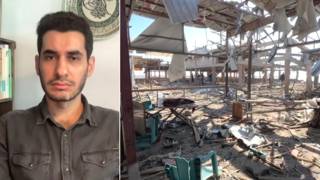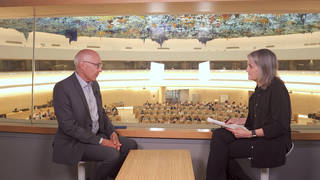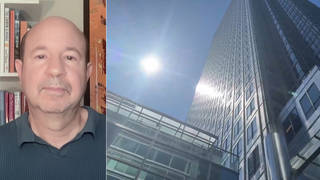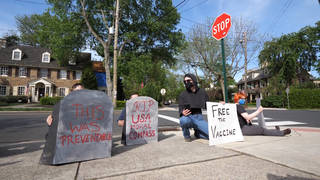
Guests
- Achal Prabhalacoordinator of the AccessIBSA project, which campaigns for access to medicines in India, Brazil and South Africa.
The Biden administration has announced it now supports temporarily waiving the intellectual property rights for COVID vaccines, in what the World Trade Organization is calling a “monumental moment.” India and South Africa first proposed the waiver in October, but the United States and other wealthy nations blocked the WTO from even opening negotiations on the proposal. Supporters say the waiver is critically needed to increase the rate of vaccine production for the Global South as COVID-19 rapidly spreads in India, Latin America and other regions where few vaccines are available. Biden’s support for the waiver is “an incredibly pleasant surprise” and “late, but still welcome,” says Achal Prabhala, coordinator of the AccessIBSA project, which campaigns for access to medicines in India, Brazil and South Africa. “The proposal is monumental because what it does is it allows for more vaccines to be manufactured in the world,” Prabhala says. “The whole world faces a crippling shortage of coronavirus vaccines.”
Transcript
AMY GOODMAN: In what the World Health Organization is describing as a “monumental moment,” the Biden administration has announced it now supports temporarily waiving the intellectual property rights for COVID vaccines. India and South Africa first proposed the waiver in October, but the United States and other wealthy nations blocked the World Trade Organization from even opening negotiations on the proposal. Supporters of the waiver say it critically needed to gear up the production level of vaccines for the Global South as the pandemic rapidly spreads in India, Latin America and other areas where few vaccines are available.
In a statement, U.S. Trade Representative Katherine Tai said, quote, “This is a global health crisis, and the extraordinary circumstances of the COVID-19 pandemic call for extraordinary measures.” She went on to say, quote, “The administration believes strongly in intellectual property protections, but in service of ending this pandemic, supports the waiver of those protections for COVID-19 vaccines,” unquote.
While the Biden administration has publicly backed a waiver, an agreement still needs to be negotiated at the World Trade Organization, which is run by consensus. The European Union and several countries, including Japan and Brazil, have also opposed opening the negotiations.
The Biden administration has not yet said if it would back waiving on intellectual property rights for coronavirus therapeutics and diagnostics. James Love of Knowledge Ecology International said Wednesday, quote, “One reason why Biden will back a waiver on vaccines but not therapeutics or diagnostics, is that vaccines in foreign markets protect us. Therapeutics, diagnostics in foreign markets, don’t.”
Meanwhile, New York Congressman Jamaal Bowman tweeted, “All this talk about 'competing' with China. Why don’t we compete to see who can save the most lives by waiving our vaccine patents?”
To talk more about Biden’s decision, we go to Bangalore in India, where we’re joined by Achal Prabhala, coordinator of the AccessIBSA project — that’s India, Brazil, South Africa — which campaigns for access to medicines in those countries. His new article in The Atlantic is headlined “Biden Has the Power to Vaccinate the World” and is co-authored with Chelsea Clinton.
Achal, welcome back to Democracy Now! Many in the United States and around the world were surprised by President Biden’s decision yesterday, announced by the U.S. trade representative. Can you explain, for people who are not following this story, the significance of calling for and supporting a temporary waiver, and what you think next has to happen?
ACHAL PRABHALA: Absolutely. Thank you, Amy. It’s nice to be back. And hello, Nermeen.
President Biden’s decision yesterday, announced through Katherine Tai, the U.S. trade representative, that the U.S. would support working towards a TRIPS waiver, that was floated by South Africa and India, did come as an incredibly pleasant surprise. It did come, however, I should just say, six months after the proposal was floated in October, in a pandemic in which lives were lost every day and continue to be. So, however welcome it is, we must acknowledge that it’s late, but still welcome now rather than never.
The proposal is monumental because what it does is it allows for more vaccines to be manufactured in the world. The whole world faces a crippling shortage of coronavirus vaccines. In sub-Saharan Africa, countries have only as little as enough to vaccinate 1% of their people. In India, which is the world’s largest vaccine manufacturer, where I live, we’ve vaccinated 2% of this population with all the doses required. We’ve vaccinated about 10% of our people with one dose. And we’re facing acute shortages right now in this country.
Now, the vaccine recipe can be shared, and the people who can share it are the U.S. government and the U.K. and the EU, as well — the U.S., in particular, because it created many of these vaccines. Now, to share the recipe, however, we need two ingredients. And the first ingredient is the legal right to make this vaccine. And so, what President Biden did today at the WTO is to take the first steps towards freeing one ingredient in that recipe.
There are several things that he has to do now. He has to make the other ingredient available. He has to force companies like Moderna and Johnson & Johnson, which each received research and development grants from you, from the American taxpayer, through BARDA and other parts of the U.S. government, up to $1 billion, which completely or significantly underwrote all the risk that these companies took in developing the vaccines. They were also, of course, given huge orders, which were lucrative and ensured that the companies could make a profit on them.
So the U.S. government has not only every moral right, but also significant legal leverage within existing U.S. law, to take control of these vaccine technologies and ship them out into the world, which requires nothing except simply sharing a guide to manufacturing the vaccine and biological material that they use — a really simple way by which the U.S. can do what it needs to do to vaccinate people within the country — nothing is compromised about the U.S. response domestically — while yet making the recipe available in the rest of the world so that hundreds of companies can make the billions of doses of this vaccine we need in order to stem the crisis in India, but also to prevent a crisis like that’s happening in India right now from happening anywhere else in the world.
NERMEEN SHAIKH: Achal, can you explain, though? The waiver will not take effect immediately. Negotiations — as U.S. Trade Representative Katherine Tai said, negotiations will be ongoing, and a decision needs to be consensus-based. And the U.S. is, of course, not the only country that’s opposed the waiver. The EU, the U.K., Switzerland, they’re all opposed to it. So, how long will this waiver take to take effect, and is there any guarantee that it will?
ACHAL PRABHALA: This is an excellent question, and I think it’s something that we must be vigilant for, because as much as the news of today is fantastic, it made me smile in really dark days here in Bangalore and in India, I must say that there is — there could be many slips between the cup and the lip here. And in Katherine Tai’s statement, she says very clearly that this is going to take some time. And now, this is a problem, because we don’t have time. The mortality rate in India on a daily basis is over 4,000 — is over 3,500 people. There are over 400,000 cases, new cases, being created every single day in this country. Look, we have to do this quickly, and yet the WTO is a deliberative process. The U.S. does probably have to bring other objecting countries into line. There have been positive signs from the European Union. They’ve said they’re ready to talk.
There is a question, firstly, of how long they will take to conclude a text, but I think there’s also a question of what they will allow to go into the text. We need a waiver in the manner that we proposed it in October of 2020. We do not need a watered-down waiver that comes with a whole range of conditions and prerequisites and ifs and buts that will make using the waiver difficult and slow. That’s not what we want. We want a clear and simple solution to remove the legal obstacles toward producing a vaccine.
Then, once this task is accomplished, we need vaccine technologies to be shared, as well, by the United States. That then will really create the circumstances for us to produce more vaccines, unfortunately, not immediately, but in three or four months. And so, each step of this process that can be made faster must be made faster, because every day that any of these steps are delayed, there are thousands of people dying around the world.
NERMEEN SHAIKH: And lastly, Achal, if you could explain? You know, people who oppose this waiver said that other countries in the world do not have the manufacturing capacity to make these vaccines. But in your Atlantic piece, you talk about what’s happening, what the plans are for the production of Russia’s Sputnik vaccine, as well as Cuba’s Soberana 02 vaccine, in Iran. If you could tell us, very quickly, what those plans are?
ACHAL PRABHALA: This idea that vaccines can only be made in the West and, at best, at a couple of companies outside the West is archaic, it’s outdated, and it’s simply dangerous to propagate at a time like this. It has, however, been propagated and, I think, quite believed by members of the — senior members of the White House staff, of the Biden administration. It has been relayed to the world, most recently by Bill Gates of the Bill & Melinda Gates Foundation, who also said that lifting patent barriers or sharing technology will make no difference in the world, because no one who can make these vaccines is not already doing so. And what we wanted to show very clearly in that piece, that I co-authored in The Atlantic with my colleague Chelsea, is to show that, in fact, this is simply not true. Not only has it not been true for many years, but it is definitely not true within the space of the pandemic.
In the last year, what has happened is really quite dramatic. There has been a sort of manufacturing movement to make more vaccines. And two things have fueled it. One, governments across the world have recognized the necessity of having vaccine manufacturing in their borders. And private industry has also recognized the immense commercial opportunity in producing these vaccines. What that has created is an unbelievable proliferation of new vaccine manufacturing sites. We profiled one of those companies, a biologics manufacturer called Virchow in Hyderabad, in Bangalore. Biologics are a class of drugs that are very, very close to vaccines. So, even though they had never made vaccines before, with the open, easy transfer of technology for the Sputnik V vaccine, which was developed by the Gamaleya Center in Russia, they were able to go from start to finish, literally from signing this document to producing those vaccines, in six months, with an investment of $11 million, a repurposed facility and about 30 people put on the job.
We’re trying to show that, in fact, there is immense manufacturing capacity, not only with regulated vaccine manufacturers in India, but with biologics manufacturers in the country, who number in the hundreds, with injectable drug manufacturers in this country, who could produce the mRNA vaccine, which is the revolutionary technology that Moderna and Pfizer are based on, which actually doesn’t involve biology, which means that it’s a very simple and easy process that many, many more manufacturers can potentially recreate. This is also not just true in India, but it’s true in places like Ghana, where manufacturers in the pharmaceutical industry have written to AstraZeneca asking for a license to create manufacturing capacity to make this vaccine. There is such a paucity of vaccines everywhere that private industry and governments together are creating an entire nexus of manufacturing capability, but we have to recognize that it exists and people can actually make these vaccines in several parts of the world. Kazakhstan is making vaccines. You know, it’s not a place that we expect vaccines to be coming from. Iran is making vaccines. Cuba has several vaccine candidates.
So the capacity exists. What the United States could usefully do to give that capacity something to make is to put these two very, very well respected, really useful Johnson & Johnson and Moderna vaccines out into the world for anyone to make, because that — that would really be the vaccine diplomacy that we all need.
AMY GOODMAN: Well, we want to thank you very much for being with us, and we’re going to link to your article in The Atlantic. We’ve been speaking with Achal Prabhala, coordinator of the AccessIBSA project, which campaigns for access to medicines in India, Brazil and South Africa. His new article, “Biden Has the Power to Vaccinate the World,” which he co-authored with Chelsea Clinton.
Next up, we’ll go to Colombia, where over two dozen protesters have been killed by security forces in an ongoing national strike against the right-wing government. Stay with us.













Media Options